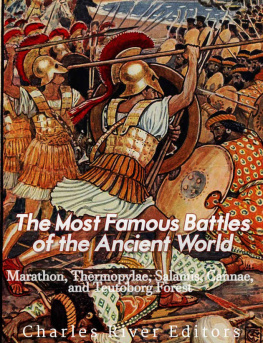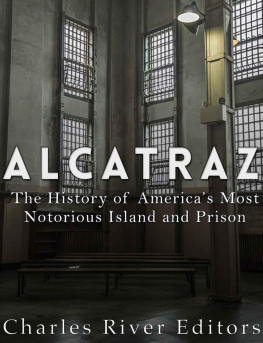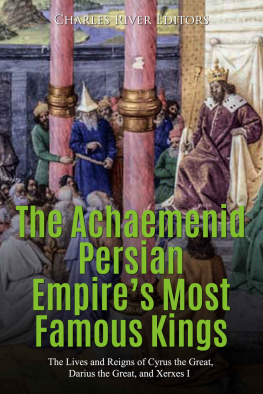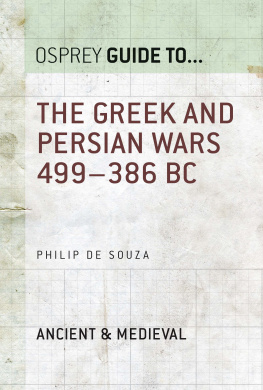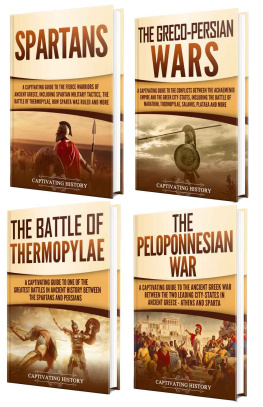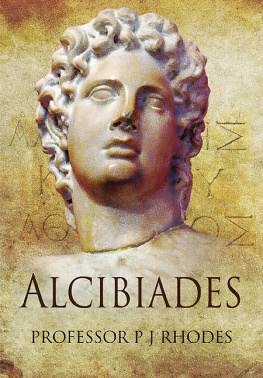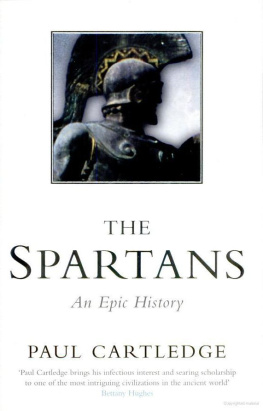Charles River Editors - The Most Famous Battles of the Ancient World: Marathon, Thermopylae, Salamis, Cannae, and the Teutoburg Forest
Here you can read online Charles River Editors - The Most Famous Battles of the Ancient World: Marathon, Thermopylae, Salamis, Cannae, and the Teutoburg Forest full text of the book (entire story) in english for free. Download pdf and epub, get meaning, cover and reviews about this ebook. year: 2017, publisher: Charles River Editors, genre: History. Description of the work, (preface) as well as reviews are available. Best literature library LitArk.com created for fans of good reading and offers a wide selection of genres:
Romance novel
Science fiction
Adventure
Detective
Science
History
Home and family
Prose
Art
Politics
Computer
Non-fiction
Religion
Business
Children
Humor
Choose a favorite category and find really read worthwhile books. Enjoy immersion in the world of imagination, feel the emotions of the characters or learn something new for yourself, make an fascinating discovery.
- Book:The Most Famous Battles of the Ancient World: Marathon, Thermopylae, Salamis, Cannae, and the Teutoburg Forest
- Author:
- Publisher:Charles River Editors
- Genre:
- Year:2017
- Rating:3 / 5
- Favourites:Add to favourites
- Your mark:
The Most Famous Battles of the Ancient World: Marathon, Thermopylae, Salamis, Cannae, and the Teutoburg Forest: summary, description and annotation
We offer to read an annotation, description, summary or preface (depends on what the author of the book "The Most Famous Battles of the Ancient World: Marathon, Thermopylae, Salamis, Cannae, and the Teutoburg Forest" wrote himself). If you haven't found the necessary information about the book — write in the comments, we will try to find it.
There are few battles in history in which the vanquished are better remembered and celebrated than the victors, and even fewer where a defeat is considered a victory. But that has become the enduring legacy of the Battle of Thermopylae, a battle as unique as it is famous. The story of the battle and the willing sacrifice of the Greek defenders to buy the rest of the retreating Greeks time is well known across the world and still resonates with audiences to this day. Last stands are the stuff of martial legends, and Thermopylae is the greatest of them all.
When the Spartans famous and sacrificial stand at the Battle of Thermopylae ended, the Athenian fleet was forced to fall back, and Xerxes massive Persian army marched unopposed into Greece before advancing on Athens. The Greek armies were scattered and unable to face the might of Persia, so Athens was forced to do the unthinkable: evacuate the entire population of the city to Salamis, from where the Athenians watched in horror as Xerxes troops plundered the defenseless city, set it aflame, and razed the Acropolis. However, the Athenians remained belligerent, in part because according to the oracle at Delphi, only the wooden wall shall save you. Indeed, this would prove true when Themistocles managed to lure the Persian fleet into the straits of Salamis. There, on a warm day in September 480 BCE, hundreds of Greek and Persian ships faced each other in a narrow strait between the Attic peninsula of Greece and the island of Salamis.
Although the Romans gained the upper hand over Carthage in the wake of the First Punic War, the legendary Carthaginian general Hannibal brought the Romans to their knees for over a decade during the Second Punic War. Cannae is still considered one of the greatest tactical victories in the history of warfare, and the fact the battle was a complete victory resulting in the wholesale annihilation of the enemy army made it the textbook example for military commanders to try to duplicate. Of course, others usually were unsuccessful. Cannae was the kind of complete victory that every commander from Caesar to Frederick the Great to Napoleon to Robert E. Lee sought, and that few generals save Caesar and Napoleon bagged whole armies is a testament to the near impossibility of achieving a victory like Cannae.
Charles River Editors: author's other books
Who wrote The Most Famous Battles of the Ancient World: Marathon, Thermopylae, Salamis, Cannae, and the Teutoburg Forest? Find out the surname, the name of the author of the book and a list of all author's works by series.

